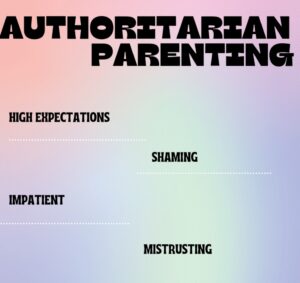
During the 1960s, developmental psychologist Diana Baumrind described three types of parenting styles, depending on the relationship that parents try to strike and balance with their children. Later, psychologists, Maccoby and Martin proposed a fourth style called uninvolved parenting.
In essence, there are four types of parenting styles:
- Authoritarian Parenting
- Authoritative Parenting
- Permissive Parenting
- Uninvolved Parenting
This article is going to deal with the first parenting style mentioned here and its pros and cons. Before we delve into it, let’s briefly look at the other three styles and the definitions they offer.
Permissive Parenting
The most important characteristics of this style of parenting are a lack of structure, consistency, and limits when it comes to discipline. The relationship seems very little interference from the parents’ behalf. They tend to be friendlier to their children and are more loving and kind towards them.
Uninvolved Parenting
Also referred to as neglectful parenting, it is a style of parenting where parents don’t respond to their children’s needs apart from the basics of food, clothing, and shelter.
Authoritative Parenting
It is an approach to child-rearing that combines warmth, sensitivity, and the setting of limits. Parents use positive reinforcement and reasoning to guide children. They avoid threats and punishments. By rule, experts consider this style as the best.
What is Authoritarian Parenting?

Strictness and rigidity are the main characteristics of this style. Authoritarian parents tend to expect their kids to follow the rules at all times. Expectations are very high from the kids while nurturing and feedbacks are little. Even if given, feedback is often negative and mistakes are punished harshly. Yelling and corporal punishment are also common.
In essence, the authoritarian parenting style is one where demands from the parents are high while responsiveness to the kids is low.
According to psychologist, Baumrind, these parents are obedience and status-oriented and expect their orders to be obeyed without explanation. These parents often use punishment rather than discipline. This style insists on unquestioning obedience and enforces good behaviour through psychological control like threats and shaming.
Characteristics of Authoritarian Parents
High Expectations
These parents are very demanding and have high expectations from their kids. But, in return, they are not so responsive to the kid’s feelings or expectations. They try to micromanage every aspect of their child’s life and have a lot of unwritten rules that the child is expected to follow even if not instructed about them.
Little Nurturing, yet, Strong Punishments
These parents are more likely to nag or yell at their children than offer encouragement or praise. They tend to value discipline over fun. While children break their rules or fall away from discipline enforced, authoritarian parents have no problem in resorting to corporal punishments like spanking and hitting the children.
Impatient to Give Explanations
These parents expect their children to simply know better than to engage in any misbehavior. They do not exhibit patience and are often seen to be too impatient to give any explanations as to why their children should avoid certain behaviours.
Shaming
Authoritarian parents can be highly critical and may use shaming as a tactic to force children into following their rules. Instead of employing ways to build the child’s self-esteem, these parents believe that shaming will motivate the children to do better.
Mistrusting
These parents do not trust their children to make good decisions and do not give them the freedom to make choices. They usually hover over them to ensure they don’t make mistakes.
Pros and Cons of Authoritarian Parenting
Pros:
Good Behaviour
Children raised by authoritarian parents tend to display good behaviour. Since their parents don’t tolerate disobedience to rules, children raised in such a setting are typically very good at following rules. They are used to negative consequences that stem from wrong behaviour and hence they avoid stepping out of the line.
Safety
With good behaviour comes an automatic priority to safety. The children don’t generally involve in any risky behaviour for fear of negative consequences. Authoritarian parents place a strong emphasis on safety.
Desire to do Right
Like being cautious about safety, a child reared by an authoritarian parent would have the desire to do it right. Since they are brought up aware of the consequences of their unacceptable actions, they would always be better at thinking through their actions before taking a plunge. Such children grow up to be less reactive and more proactive.
Goal-driven
Since the authoritarian parent has a specific set of expectations and rules from the children, they grow up to be more goal-oriented. They are very used to adherence to detailed plans and precise instructions. Hence the children can easily understand what steps to follow to accomplish a goal.
Cons:

Rule-dependent
Authoritarian parenting is based on implemented rules and unwritten laws resulting from ‘Because I said so.’ Since these children are more habituated to following rules, they feel insecure and unsure of how to behave, when confronted with situations that don’t have guidelines.
Low Self-esteem
This type of parenting does not allow a child to be free thinkers or to express their thoughts to their parents. The adults raise them to obey and be quiet. Such children exhibit low self-esteem. They seem to lack the ability to communicate their needs and tend to lose their individuality.
Low Social Competence
Children raised by authoritarian parents mostly act fearful or shy around others. Since they grow up in a controlled environment, they have difficulty in social situations that may require better emotional intelligence.
Rebellion
They also may display aggressive behaviour outside the home. These children may eventually grow tired of the endless list of rules and may sometimes deliberately defy their parents. Such children may also turn out to be bullies by trying to exercise the control they constantly experience. On the other hand, they may also be easily bullied, given their low self-esteem and low social competence.
Hope this article is useful in bringing out what is authoritarian parenting about. Please leave your inputs in the comments!
Leave a Reply